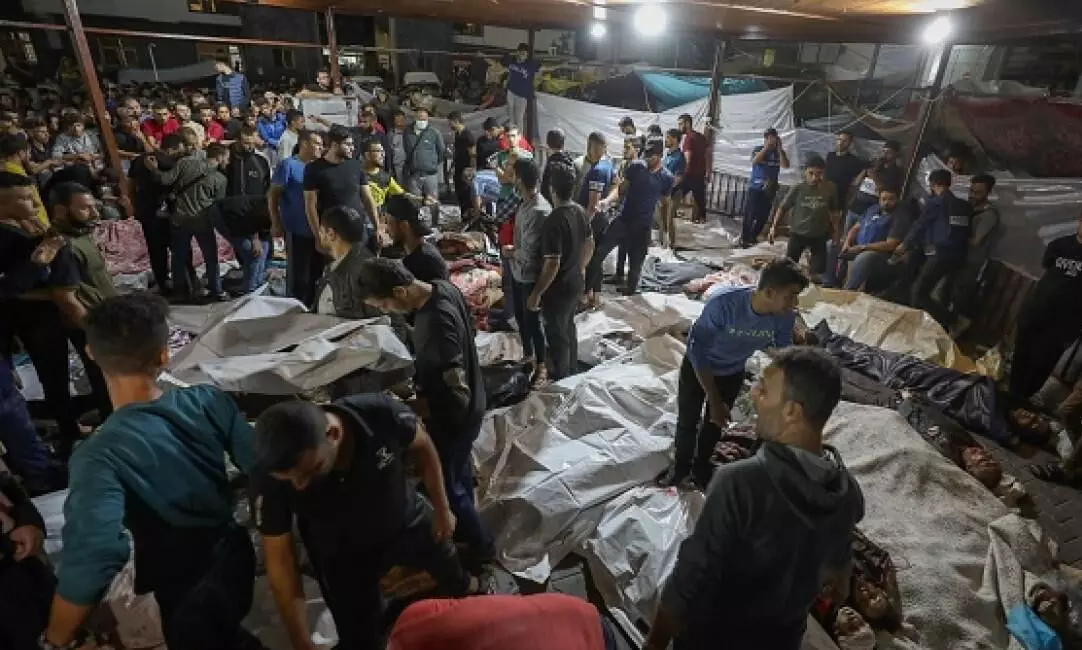
Gaza now uninhabitable as war continues: UN
text_fieldsUnited Nations: Three months into Israel's conflict with Hamas, the UN humanitarian director has declared Gaza to be "uninhabitable" and issued a dire warning about impending famine and a public health crisis.
Martin Griffiths provided a grim assessment of the catastrophic effects of Israel's military response to the Hamas attacks on October 7, claiming that the 2.3 million people living in Gaza face "daily threats to their very existence" while the rest of the world looks on.
He said that locations where Palestinians were ordered to relocate had been bombed, that tens of thousands of people—mostly women and children—had been killed or injured and that families were sleeping outside as the temperature dropped, the Guardian reported.
Griffiths said: “People are facing the highest levels of food insecurity ever recorded [and] famine is around the corner.”. Around 180 Palestinian women give birth each day amidst the chaos, medical facilities are under constant bombardment, infectious diseases are spreading, and the few partially operational hospitals are overburdened and desperately short of supplies.
“Gaza has simply become uninhabitable,” the UN undersecretary-general for humanitarian affairs said.
According to him, the humanitarian community is facing an “impossible mission” as aid workers from partner organisations and UN personnel are being shot and killed while trying to assist over two million people; at the same time, communications are being cut off, roads are being damaged, truck convoys are being attacked and essential commercial supplies are "almost nonexistent."
Declaring that "it is time for the international community to use all its influence to make this happen," Griffiths emphasised the demands of the UN for an immediate end to the war and the release of all captives.
Around 1,200 people were killed in Hamas's (7 October) invasion of southern Israel; in addition, about 250 individuals were taken hostage by the group's members. There are still over 120 in captivity.
According to the health ministry in the Hamas-ruled region, Israel's air, ground, and sea assault in Gaza, which was intended to completely destroy Hamas, has killed over 22,400 people, with women and children accounting for two-thirds of the casualties. There is no distinction made in the count between combatants and civilians.
Approximately 85% of Gaza's population has been forced to flee their homes as a result of the three-month bombardment, and the UN has identified over 37,000 buildings that have been damaged or destroyed.
With less than 200 aid trucks entering Gaza each day—less than half the prewar level—and distribution being delayed by the fighting, the UN children's agency, Unicef, stated on Friday that the majority of young children and pregnant women aren't getting enough nutrition.
According to a Unicef report, 90% of children under the age of two only eat two or fewer of the five recommended food groups each day, primarily milk or bread. Pregnant women reported eating only one food group each day in 25% of cases.
According to Unicef, the number of instances of diarrhoea among children under five has increased from 48,000 to 71,000, which is a sign of inadequate nutrition. In the Gaza Strip, there are typically only 2,000 instances of diarrhoea reported every month.
Following the Hamas attack, Israel quickly cut off supplies of fuel, food, clean water, medicine, and electricity to Gaza. In response to pressure from the US, it began to allow a small amount of aid to pass through Egypt in late October, and since then, the daily average of trucks entering the country has increased to 200.
Israeli officials have pointed the finger at UN agencies for any shortages, claiming time and time again that there is adequate food in the region and that they have taken the required actions to let aid in.
Stephanie Tremblay, a UN associate spokesperson, restated this point on Friday, saying that "the current response is only meeting a fraction of people's needs."
She repeated what the UN secretary-general, António Guterres, said last month: “It’s a mistake to quote the effectiveness of the humanitarian operation in Gaza based only on the number of trucks. An effective aid operation in Gaza requires security. It requires staff who can work in safety. It requires good logistical capacity and the resumption of commercial activity.”






